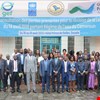
/ Central Africa
Cameroon revises its 1998 Water Law to improve water governance
Since its adoption in 1998 as the principal judicial law governing water resources in Cameroon, the Water Law N°98/005 of April 14, 1998, is being revised for the first time.
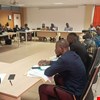
/ Central Africa
GWP-Central African Republic appoints a new Chair
Following a unanimous decision of the steering committee of the Central African Republic Country Water Partnership (CWP CAR), the Director General of Water Resources, Mr. Barnabé FALIBA, was appointed chair of GWP-CAR, with Madam Yvette NDONGA as the vice chair.
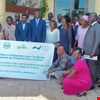
/ Central Africa
GCF Readiness: Stakeholders identify priority climate project ideas in the Central African Republic
A multi-partner workshop held on May 3rd to 4th in Bangui in view of completing output 3 of the GCF Readiness project in the Central African Republic, which is the development and submission to the GCF of two project concept notes integrating gender and social inclusion with a focus on water-related themes.
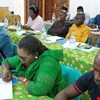
/ Central Africa
GWL in CAR: Addressing gaps in the water and climate sectors through popularizing policy documents
To promote a climate-resilient approach to the management of water resources in the Central African Republic, GWP-Central African Republic (CWP-CAR), in collaboration with the Ministry of Energy Development and Water Resources, organized a two-day multi-stakeholder workshop on May 4–5 in Bangui to popularize and promote the ownership of existing strategy and policy documents in the country’s water and climate sectors.
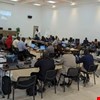
/ Central Africa
EWS and IWRM Project: WMO, LCBC and GWP-CAf hold second regional stakeholder consultation
The Lake Chad Basin Commission and GWP-Central Africa, with the support of the World Metrological Organization, organized the second regional stakeholder consultation for the "Integrated Water Resources Management and Early Warning System for Climate Change Resilience in the Lake Chad Basin" project. The regional workshop was held in N’Djamena, Chad, on March 29th–31st, 2023.
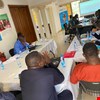
/ Central Africa
Improving Water Investments: Stakeholders in Cameroon verify the country’s AIP Scorecard results
Representatives of government ministries, private sector, civil society, and research organisations met in Yaoundé under the umbrella of a stakeholder consultation organized by GWP-Cameroon in collaboration with the Ministry of Water Resources and Energy (MINEE) on March 23rd, 2023 to verify and finalize the country’s score on the AIP scorecard.
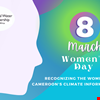
IWD 2023: Meet the women behind Cameroon’s Climate and Weather Information System
GWP-Central Africa joins the international community to celebrate the 2023 International Women’s Day commemorated under the theme, “DigitALL: Innovation and technology for gender equality”.
This year’s theme seeks to recognize and celebrate the women and girls who are championing the advancement of transformative technology and digital education. It also explores the impact of the digital gender gap on widening economic and social inequalities. (UN Women)
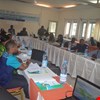
/ Central Africa
SDG 6 Support Programme: Stakeholders in Cameroon test the Gender Checklist
How can GWP support governments to better integrate gender into their IWRM plans and policies to improve country score on SDG 6.5.1? In response to this, GWP-Central Africa organized a multi-stakeholder consultation in Mbalmayo, Cameroon on February 22nd to test the gender checklist developed by the Global Water Partnership (GWPO) under its SDG 6 IWRM Support Programme.
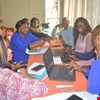
/ Central Africa
WACDEP-G Cameroon: Stakeholders identify gender entry points in the water and climate sector
Thirty-five stakeholders from state institutions, civil society organizations, parastatals, Research institutions and the private sector identified processes, actors, and information systems involved in the development of policies, laws, and projects at the national and local levels in the water and climate sector which can serve as entry points for gender.

/ Central Africa
GWP-CAf – ECCAS collaboration: GWP-CAf and ECCAS discuss the way forward
At the invitation of ECCAS, a meeting was held between the ECCAS Department of Environment, Natural Resources, Agriculture and Rural Development (DERNADR) and GWP-Central Africa at the ECCAS headquarters in Libreville, Gabon in December 2022.